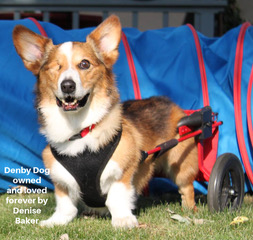
What is Degenerative Myelopathy
(otherwise known as DM)
DM is a degenerative disease affecting the pet’s spinal cord which will gradually lead to a loss of mobility, and eventually, loss of bladder and bowel control. This disease is seen in dogs over 4 years of age, (most often in dogs over 8), with symptoms that will become progressively worse over time. Some call it the canine version of ALS (Lou Gehrig’s Disease)
If you are worried that your dog may have this, the following are a few symptoms which can indicate early-stage DM
- Difficulty rising into a standing position
- Scraping nails when walking
- Knuckling (rear paws turning under so that your dog walks on their knuckles)
- Stumbling and tripping
- Rear legs crossing
- Loss of balance
Unfortunately, degenerative myelopathy can quickly become severe, leading to the following symptoms:
- Loss of ability to stand on hind legs
- Unable to stand, even when lifted into position
- Loss of bladder and bowel control
- Gradual loss strength in front end
How fast does DM progress?
Sadly, DM tends to progress very quickly. Most dogs that have been diagnosed with degenerative myelopathy will become paraplegic within six months to a year.
How long can a dog live with DM?
It’s important to understand that while it can be very distressing to see your dog lose their mobility at such a fast rate, DM is not usually painful.
There is no treatment available for dogs diagnosed with DM, and the progressive nature of this disease means that your dog can quickly become unable to walk unassisted and will soon become incontinent.
Pet parents may choose palliative care for their dog once mobility has been lost; however, some dogs can do very well for months or even years with the help of a doggie wheelchair.
How can I help my dog if they have DM?
Following the diagnosis of DM, your vet will help you to decide the best approach for your pet. While there is no treatment, there are ways to help you and your dog cope with this condition. Intensive physical rehab can extend a dog’s survival time by up to three years, versus six months to a year for dogs who do not receive therapy. As well as considering different styles of dog wheelchairs, slings and carriers, it is very important to keep your dog at a healthy weight since obesity adds extra strain to the body.
What Breeds can get DM?
While any dog can get DM, the most common dog breed to be diagnosed is the German Shepherd. Other breeds that face an increased risk of this disease include:
- Pembroke and Cardigan Welsh Corgis
- Chesapeake Bay Retrievers
- Bernese Mountain Dogs
- Cavalier King Charles Spaniels
- Golden Retriever
- Boxers
- Wire Fox Terriers
- Borzoi
- Golden Retriever
- Great Pyrenees Mountain Dog
Can you test for DM?
There is a test available to see if your dog carries the gene responsible for DM. There are 3 results that you could receive:
- A CLEAR result shows that the dog has inherited two genes from its parents that are mutation free. The dog will not develop Degenerative Myelopathy and cannot pass faulty genes on to any offspring
- A CARRIER result indicates that the dog has inherited one normal copy of the relevant gene, and one mutation. This means that the dog has a strong likelihood of passing on the condition to its offspring, but not of developing the condition itself. Where a potential mate also carries the gene mutation, any offspring will be at high risk of developing the condition and also of passing it on.
- An AT RISK result indicates that the dog has inherited two copies of the mutated gene from its parents and is highly likely to develop Degenerative Myelopathy over the course of its lifetime. It will definitely pass on the mutation to any offspring.

I’m going to finish up this Blog with some words from a very dear friend who cared for and very much loved a dog with DM. Her name is Denise, and her dogs name was Denby.
“During the nearly 3-year DM journey with my Denby, I witnessed his courage, strength and heroism as he learned to run circles around me in his cart. He taught me to find joy in the seemingly simple things in life and from his stroller the world of smells still beckoned him.
Yes, caring for your DM pup will present challenges but you will find solutions. I even know a DM pup who skied down a mountain in a backpack! Your best friend will lose their ability to walk, run and bark at you but they will never lose their love for you.
The 3 years Denby and I navigated the preventable genetic disease, Degenerative Myelopathy, not only changed Deby’s life but it changed my life as well. And I am forever grateful.
Please visit ShadeOutDM on Facebook for more information and support.”
